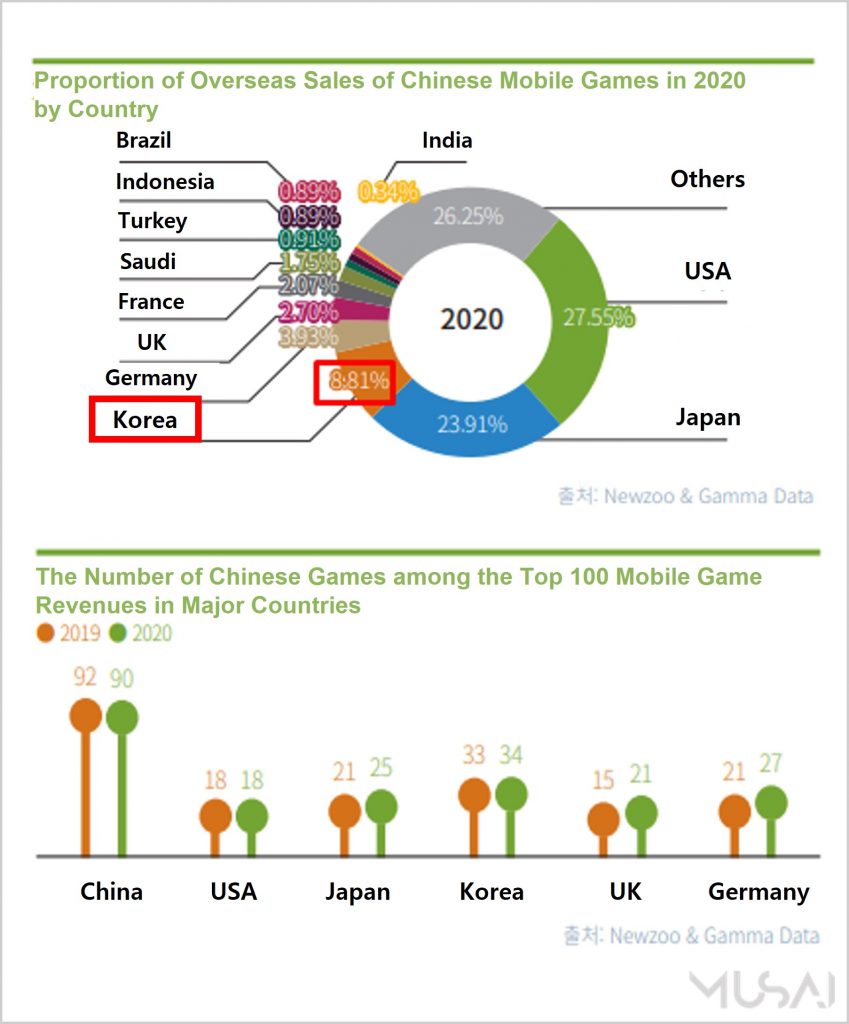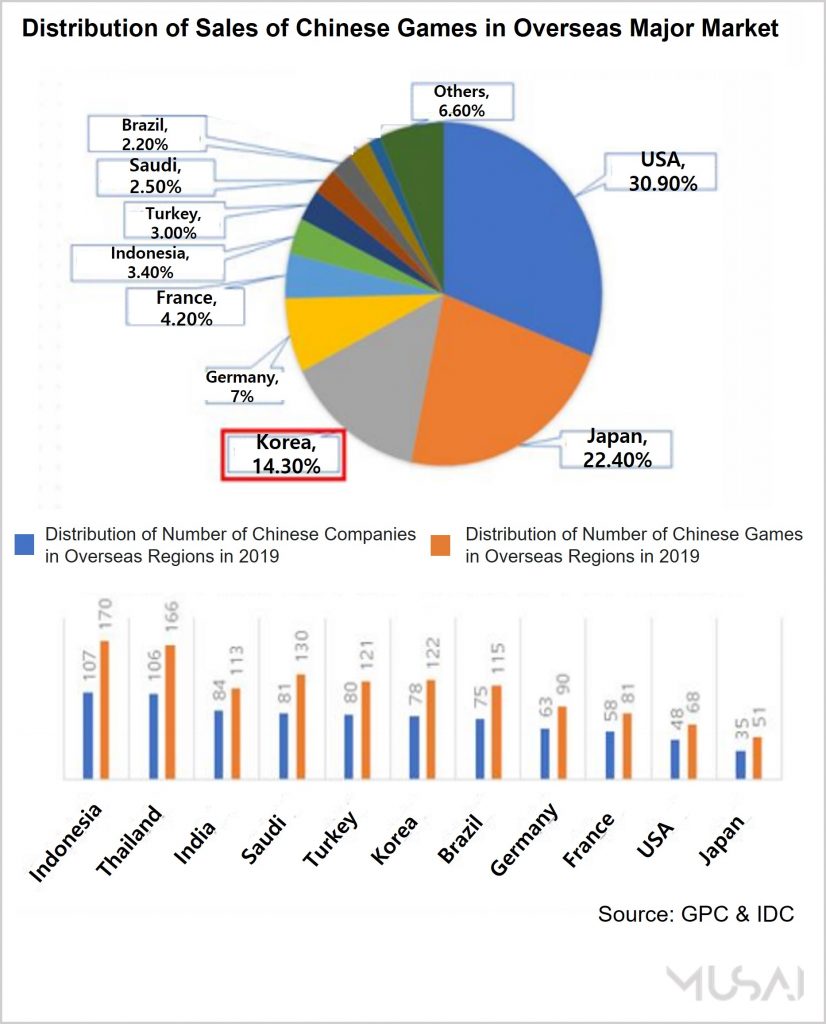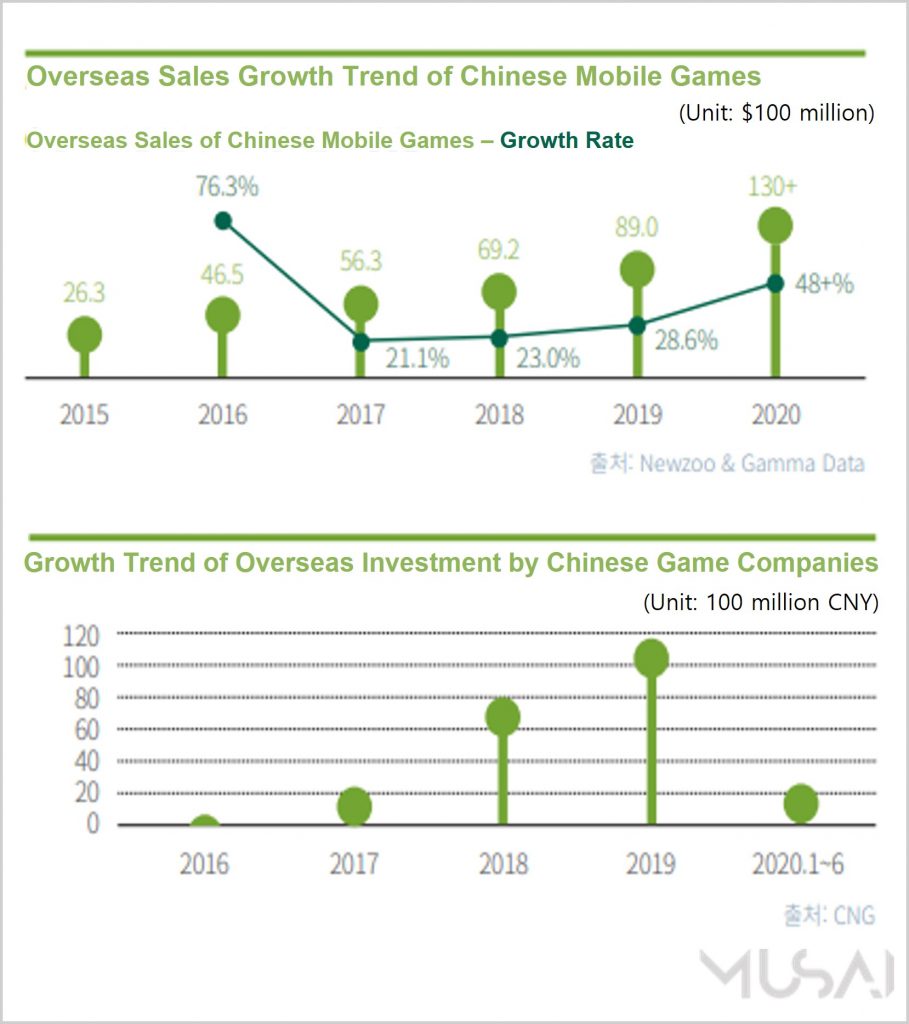[MUSAI] Chinese Language Trends in the Korean Game Localization Industry

2021-07-16
The scale of Chinese games in the global gaming market has been constantly expanded every year. According to that, a number of media and consulting organizations have been publishing various data and reports regarding the Chinese gaming market. What about the perspective from the localization industry? How will changes in the Chinese gaming market affect the localization industry? In this article, we will discuss the trend of Chinese localization based on the Korean game localization industry.
Intro. Misunderstanding about Major Asian Languages
The major APAC languages in the localization industry can be roughly classified as follows:
|
Asia-Pacific ● East Asia or Northeast Asia – CCJK (Chinese Simplified, Chinses Traditional, Japanese, Korean) ● Southeast Asia – Thai, Vietnamese, Malay, Indonesian, etc. |
In this article, we will focus on the East Asian region. The four languages – CCJK are known as essential languages to be localized and about them, there is one misunderstanding encountered through clients in Europe and the Americas arises like this “they are in the same Asian region. Wouldn’t it be possible to localize the four languages at once in one country like Europe?”
However, if you look at each language separately, they are all different languages with a completely different culture and specificity. Therefore, localization companies in the East Asia are aware that it is not easy to handle all four languages in one country and there are limitations.
Of course, it’s hard to say that it is totally impossible. There were several MLVs that had Asian hubs in Japan and China to handle four languages. However, this case is only possible when local branches are operated together in each country. That means actual production is done by each countries and centralized the project management or engineering task through the hub in Japan or China.
For Your Background Knowledge: the Specificity of Chinese in terms of the Localization Industry
Let’s take a closer look at Chinese localization based on the Korean localization industry.
International Relationships
International political and diplomatic factors rarely affect certain a language in the localization industry, except for Chinese. The biggest part is the issue of the game service license. It is a known fact that it is difficult for Korean games as well as games from other countries to enter China due to this issue. Even if the issue is resolved, the door to China can be closed at any time due to diplomatic and cultural factors such as North Korea’s nuclear-related issues, Northeast project, etc.
How was the ‘Chinses to Korean’ Localization Market Created?
As the export of Chinese games began in earnest, localization from Chinese to Korean also increased and the market was initiated. In those early days, Chinese game companies conducted translations with “Korean-speaking” people living in China.
However, because they are not native Korean, the quality did not meet expectations and the unit price was also arranged very low. Due to this trend, the standard of the unit price considered by Chinese game companies has been set lower than that of other languages, and even if a Chinese-Korean translation is conducted in Korea with native Koreans, there was a limitation to improve the translation quality because it had to meet the unit price which already set by the Chinese customers. This became the fundamental reason to hinder the localization environment available to improve the quality of the Chinese-Korean localization.
Fortunately, as the translation quality level that Chinese game companies expect has been increased, appropriate unit pricing is also becoming a reality. Major Chinese game companies are now discovering and having a partnership with the localization agencies that focus on quality rather than unit price.
Prospect of Chinese Localization 1. Chinese to Korean
The volume of the Chinese-Korean translation is expected to steadily increase. The following factors can be pointed out as the background.
First, the position of Korean market in the global expansion of Chinese games. According to various data, the ratio of major export countries for Chinese games is in order of ‘USA>Japan>Korea…’.
Data 1. KOCCA (Korea Culture Content Agency) ‘2021 Global Game Industry Trend: Jan + Feb’

Data 2. KOCCA ‘2020 Content Industry Trend of China Vol.1’

Second, businesses are naturally looking for ways to advance overseas due to the maturity of the Chinese market. ‘2021 Global Game Industry Trend: Jan + Feb’ published by KOCCA reported that “In 2018, when even the approval of game service license by China was stopped, 9,705 game companies closed their doors, and 18,710 companies went out of business in 2019 according to the data from the Chinses state-run media ‘CCTV’”
Third, Chinese games has been becoming competitive in the global market. As there are many games proven in competition in the Chinese domestic market, they also achieved successful result in overseas through their potential. In addition, Chinese game companies actively carried out mergers and acquisitions with famous foreign gaming companies by mobilizing their capital. In particular, they focused on securing the license of high-quality original IPs and it made them easier to enter overseas markets naturally.

Fourth, the success story of <Genshin Impact>: Changes in user perception and complete positioning of Chinese games in Korea
In the case of <Genshin Impact>, it was a huge success in Korea last year and it brought many changes in the market so I can’t help but mention it. The completeness, fun, and the debate about copycat of the game have already been discussed a lot through various media, and it was also available to find out that the completion of its Korean translation and voice-over affected the success of the game through the positive reaction of gamers.
As mentioned at the beginning of the article, the Chinese-Korean localization market was weak in quality for various reasons. However, the localization industry was not the only one who recognized that problem. Korean gamers also have known it and actually had high complaints about the Chinese-Korean localization.
These complaints were resolved through <Genshin Impact>. Many gamers lots of credits on the localization and this even made changes in the perception about the overall Chinese-Korean gaming localization. This success story is expected to encourage other large Chinese game companies in their efforts to raise the level of localization in the future.

Prospect of Chinese Localization: Korean to Chinese
In the case of the Korean-Chinese localization, its volume is not expected to increase significantly. Even if the issue of game service license is resolved, it may fluctuate greatly with various factors, so it is necessary to keep an eye on it.
The biggest background is still the issue of game service license in China. It has been closed for several years and it is difficult to predict how it will change depending on the international situation in the future. On the other hand, it is unclear whether the demand for Korean-Chinese translation will increase even if the door of China is opened. KOCCA has pointed out that pointed out the difficult situation for the Korean games to aggressively advance into the Chinese market in terms of ‘competitiveness’ in ‘2021 Global Game Industry Trend: Jan + Feb’ report. Furthermore, “Domestic games now have to overcome the hurdles of Chinese games in order to advance into overseas markets and achieve results” and “When we develop our strength by looking back on why domestic gamers reacted to Chinese games and why we couldn’t make such games before them, we can compete with Chinese games both in overseas markets and the Chinese market regardless of the issue of the game service license”, added.
On the other hand, the Korean-Chinese translation in the gaming market is not hopeless. Since there are so many Chinese-speaking users who do not live in China, the demand in Korean-China localization is steadily increasing.
▶ A Korean article covering the issue of game service license
See (only Korean): https://www.hankyung.com/it/article/2020101812841

Voice-over in Chinese
Briefly speaking, Chinese local recording studios have their own system and process.
Usually, when working on Chinese voice-over, some of major global game companies cooperate with a local studio in China. The companies who experienced Chinese local studios often say that they had a lot of difficulties due to the difference in their work process and language barrier. For example, the criteria of quotation for voice-over are mostly similar all over the world in a large sense even although there are differences in detail from country to country. However, China has different criteria to produce the quotation. As for Chinese voice-over, we will discuss it in more detail in another article later.
In the global gaming market, Chinese games are growing rapidly every year. Besides, Chinese market has become essential for games preparing to launch globally, so the concerns about localization in Chinese are inevitably deeper than before. I hope that today’s article about Chinese localization demonstrated from the perspective of the Korean localization industry gives you a brief insight and helps your successful launching.
** Did you enjoy the news of Musai? Please click subscribe and share the story.
BOOST YOUR PLAY! Musai Studio







